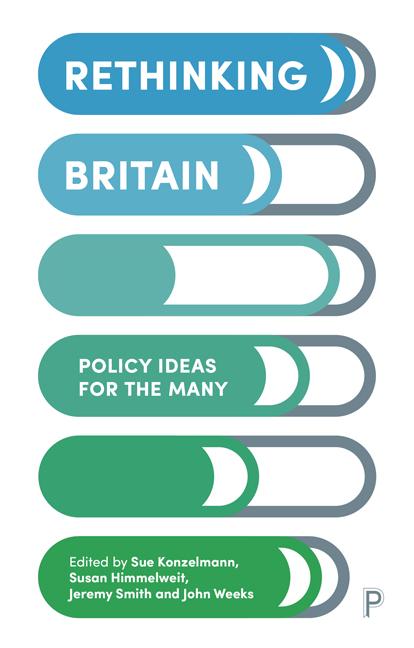Book contents
- Frontmatter
- Contents
- List of Tables and Figures
- The Contributors
- Foreword
- Introduction
- Interlude: ‘Mirror, Mirror, On the Wall – Who has the Highest Debt of All?’
- Part One Building a Full-Employment Economy: Introduction
- Part Two Public Investment – Prioritising Society Rather than Profit: Introduction
- Part Three Making Finance Work for Society: Introduction
- Part Four Genuine Social Security: Introduction
- Part Five How to provide for Social Needs: Introduction
- Conclusion
- Jargon Busters
- References and Further Reading
- Index
7 - What Should be done about Private Schools?
Published online by Cambridge University Press: 11 March 2021
- Frontmatter
- Contents
- List of Tables and Figures
- The Contributors
- Foreword
- Introduction
- Interlude: ‘Mirror, Mirror, On the Wall – Who has the Highest Debt of All?’
- Part One Building a Full-Employment Economy: Introduction
- Part Two Public Investment – Prioritising Society Rather than Profit: Introduction
- Part Three Making Finance Work for Society: Introduction
- Part Four Genuine Social Security: Introduction
- Part Five How to provide for Social Needs: Introduction
- Conclusion
- Jargon Busters
- References and Further Reading
- Index
Summary
What's the issue?
For all the talk of grammar schools, academies and free schools, the British school system remains dominated by a small but powerful segment at its summit – its private schools. Until some radical reform is set in train, an unreconstructed private school system, with its current enormous resource superiority and exclusiveness, hanging over the state system as a beacon for unequal treatment and privilege, will make it impossible to sustain a fair and socially just state education system. The reform of private schools should be a priority.
How can private schools be reformed to make the school system better and fairer for all?
Analysis
Britain's private schools provide a good education for their pupils in several ways. But they hold back the children educated in state schools. They secure a hugely disproportionate share of places at Oxford, Cambridge and other prestigious universities, and offer a golden ticket to financially rewarding jobs. They help to perpetuate a low level of social mobility. Above all, this is unfair, and the majority feel this way: in a recent poll, more than three-quarters of those who expressed an opinion one way or the other agreed that private schooling in the UK is unfair. Moreover, the concentration of our teaching resources on just this small segment of the population is socially inefficient. And the hold of the privately educated on positions of influence is deeply undemocratic.
Private schooling has become a sophisticated service industry, much changed from the spartan settings of half a century ago. Since the 1980s, resources have ballooned, and fees have trebled in real terms, the average now standing at over £17,000 per year for one child. Management has been modernised. Several studies show that private schools are associated with better academic progress at every educational stage through to sixth form. This evidence is based on comparisons that control for children's social and economic backgrounds, and for their prior achievements. Private schools are more effective at preparing children for conventional exams; they also deliver a broader educational curriculum than is afforded in state schools, with much emphasis on cultural and sporting activities. Their successes owe much to their vastly superior resources, and the concentration within them of a peer group having relatively few social and behavioural problems.
- Type
- Chapter
- Information
- Rethinking BritainPolicy Ideas for the Many, pp. 211 - 215Publisher: Bristol University PressPrint publication year: 2019



